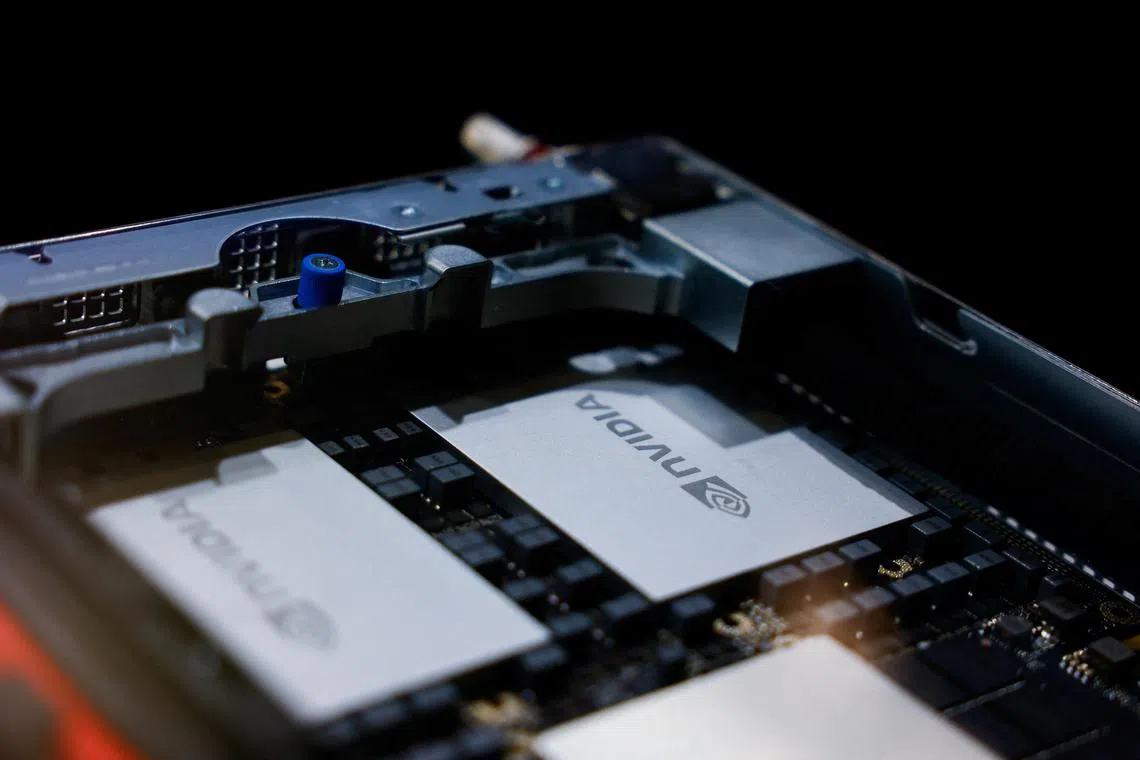US weighs capping exports of AI chips from Nvidia and AMD to some countries
Sign up now: Get ST's newsletters delivered to your inbox

Some US officials have come to view semiconductor export licences, especially for Nvidia chips, as a point of leverage to achieve broader diplomatic goals.
PHOTO: REUTERS
Follow topic:
Washington – Biden administration officials have discussed capping sales of advanced artificial intelligence (AI) chips from Nvidia and other American companies on a country-specific basis, people familiar with the matter said, a move that would limit some nations’ AI capabilities.
The new approach would set a ceiling on export licences for certain countries in the interest of national security, according to the people, who described the private discussions on condition of anonymity. Officials are focused on Persian Gulf countries that have a growing appetite for AI data centres and the deep pockets to fund them, the people said.
Deliberations are in early stages and remain fluid, the people said, noting that the idea has gained traction in recent weeks. The policy would build on a new framework to ease the licensing process for AI chip shipments to data centres in places like the United Arab Emirates and Saudi Arabia. Commerce Department officials unveiled those regulations last month and said there are more rules coming.
The agency’s Bureau of Industry and Security, which oversees export controls, declined to comment. Nvidia, the market leader for AI chips, also declined to comment, as did Advanced Micro Devices (AMD). A representative for Intel didn’t respond to a request for comment.
A spokesperson for the White House National Security Council declined to comment on the talks but pointed to a recent joint statement by the United States and UAE on AI. In it, the two countries acknowledged the “tremendous potential of AI for good”, as well as the “challenges and risks of this emerging technology and the vital importance of safeguards”.
Setting country-based caps would tighten restrictions that originally targeted China’s AI ambitions, as Washington considers the security risks of AI development around the world. Already, the Biden administration has restricted AI chip shipments by companies like Nvidia and AMD to more than 40 countries across the Middle East, Africa and Asia over fears their products could be diverted to China.
At the same time, some US officials have come to view semiconductor export licences, particularly for Nvidia chips, as a point of leverage to achieve broader diplomatic goals. That could include asking key companies to reduce ties with China to gain access to US technology – but the concerns extend beyond Beijing.
It is unclear how leading AI chipmakers will react to additional US restrictions. When the Biden administration first issued sweeping chip regulations for China, Nvidia redesigned its AI offerings to ensure it can keep selling into that market.
If the administration moves forward with country-based caps, it may prove difficult to deliver a comprehensive new policy in the final months of US President Joe Biden’s term. Such rules could be challenging to enforce and would be a major test of US diplomatic relationships.
Governments around the world are in a quest for so-called sovereign AI – the ability to build and run their own AI systems – and that pursuit has become a key driver of demand for advanced processors, according to Nvidia chief executive Jensen Huang. Nvidia’s chips are the gold standard for data centre operators, making the company the world’s most valuable chipmaker and the top beneficiary of the AI boom.
China, meanwhile, is working to develop its own advanced semiconductors, though they still trail the best American chips. Still, there is concern among US officials that if Huawei Technologies or another foreign maker one day offers a viable alternative to Nvidia chips – presumably with fewer strings attached – that could weaken the US ability to shape the global AI landscape.
Some US officials argue that it is only a distant possibility, and that the Washington should adopt a more restrictive approach to global AI chip exports given its current negotiating position. Others warn against making it too difficult for other countries to buy American technology, in the event China gains ground and captures those customers.
While officials have debated the best approach, they have slowed high-volume AI chip licence approvals to the Middle East and elsewhere. But there are signs things could get moving soon: Under the new rules for shipments to data centres, US officials will vet and preapprove specific customers based on security commitments from both the companies and their national governments, paving the way for easier licensing down the road. BLOOMBERG

